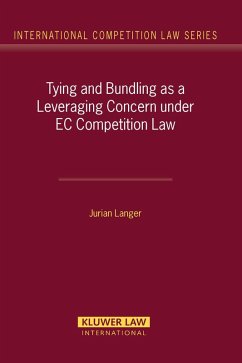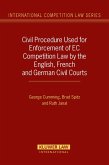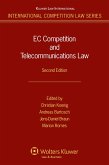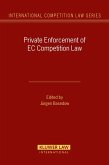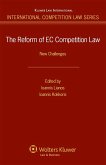Despite great strides in enforcement of the cartel prohibition of article 81 EC and major merger control reform, EC competition law still lacks clear modernised and effects-based standards for anti-competitive abuses under article 82 EC. In a masterful engagement with this issue, the thoughtful and original analysis in this book focuses on tying and bundling. Although these ubiquitous business practices are primarily addressed under article 82 EC as constituting abusive behavior, a wealth of economics literature emphasizes their strategic and efficiency motivations. However, there is a balance to be found, as this book ably demonstrates.In the course of the analysis, the author zeroes in on such central questions as the following:- What tests are available to determine whether two products are distinct or not?- Under which circumstances is anti-competitive leveraging feasible?- Which efficiency motivations should be accepted?- How does one valuate the possible efficiencies in the short run and the risk of leveraging effects in the long run?- What factors should be considered when answering the separate product issue?- What are the implications for the burden of proof under article 82 EC?- Should leveraging concerns due to tying and bundling be addressed under ex ante merger control or does scrutiny under article 82 EC suffice?In his examination of the various responses to these probing questions, the author is able to formulate a very useful diagnosis of what factors determine whether a tied or bundled entity is likely to engender anti-competitive effects. The presentation is supported throughout by detailed reference to relevant legal-economic doctrine, laws, and judicial interpretation by European and U.S. courts, the European Commission, and antitrust agencies.In its development of effects-based tests for assessing tying and bundling practices, this important book will be of special value to policymakers and regulatory officials involved in enforcement of EC or Member State competition law. It will also be welcomed by academics in both law and economics as a truly cogent and workable approach to the solution of one of the most vital and intriguing debates in the antitrust field.Dr. Jurian Langer is an attorney with Stek in Amsterdam, where he focuses on EC law and competition law. He also lectures European law at the University of Amsterdam. This book is the result of his PhD-thesis, defended at the European University Institute in 2006.
Dieser Download kann aus rechtlichen Gründen nur mit Rechnungsadresse in A, B, BG, CY, CZ, D, DK, EW, E, FIN, F, GR, HR, H, IRL, I, LT, L, LR, M, NL, PL, P, R, S, SLO, SK ausgeliefert werden.

